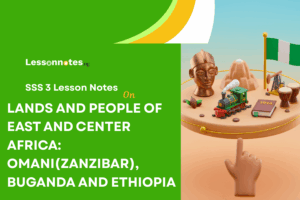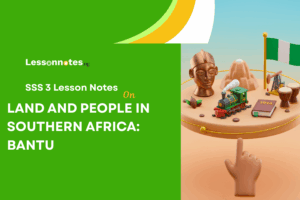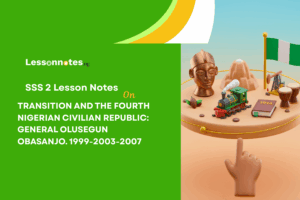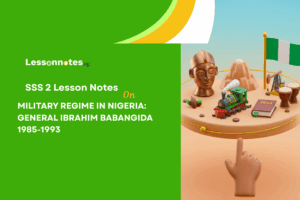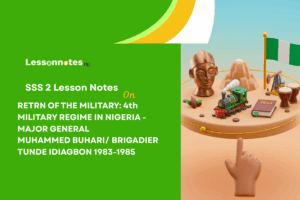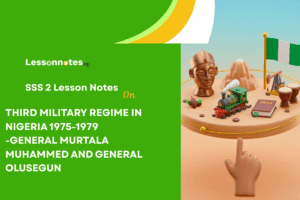5th Military Regime In Nigeria: General Ibrahim Babangida 1985-1993 SS2 Nigerian History Lesson Note
Download Lesson NoteTopic: 5th Military Regime In Nigeria: General Ibrahim Babangida 1985-1993
On August 27, 1985, Major General Ibrahim Badamasi Babangida (often called IBB) took power in Nigeria through a bloodless coup. He overthrew the military government of Major General Muhammadu Buhari. Babangida called his takeover a “palace coup” because it was carried out by military officers who were already part of the government.
Babangida was from Niger State in the northern part of Nigeria. He was a professional soldier who had risen through the ranks of the military. When he took power, he gave himself the title of “President” instead of “Head of State” which military rulers had used before. He also promoted himself to the rank of General.

Reasons for the Coup
Babangida gave several reasons for overthrowing the Buhari government:
- Human Rights Violations: He said the Buhari regime had detained many people without trial and restricted freedom of speech.
- Harsh Economic Policies: The Buhari government’s strict economic measures had caused hardship for many Nigerians.
- Military Exclusion: Some senior military officers felt left out of decision-making under Buhari.
- No Transition Plan: Buhari had not set a timetable for returning Nigeria to civilian rule.
- Leadership Style: Babangida claimed Buhari’s leadership was too rigid and unwilling to listen to advice.
The Structure of Government
Babangida set up his government with these key structures:
- Armed Forces Ruling Council (AFRC): This replaced the Supreme Military Council and was the highest decision-making body.
- Council of Ministers: Made up of both military officers and civilians who ran government ministries.
- State Governors: Military officers were appointed as governors of the states.
- Local Governments: Civilians were allowed to run local governments through elections.
Political Reforms and Transition Program
One of Babangida’s first promises was to return Nigeria to civilian rule. He set up a long transition program:
- Political Bureau: In 1986, he created a group to recommend how Nigeria should return to democracy.
- Constitution Review: A committee was set up to create a new constitution.
- Two-Party System: In 1989, Babangida created two political parties:
- Social Democratic Party (SDP) – described as “a little to the left”
- National Republican Convention (NRC) – described as “a little to the right”
- The government wrote the constitutions of both parties, built their offices, and gave them money.
- New States Creation: Babangida created more states, bringing the total to 30 by the end of his rule.
- Local Government Elections: In 1987 and 1989, elections were held for local governments.
- State Elections: In 1991, governors and state assemblies were elected.
- National Assembly Elections: In 1992, senators and representatives were elected.
- Presidential Election: On June 12, 1993, a presidential election was held between Chief M.K.O. Abiola (SDP) and Alhaji Bashir Tofa (NRC).
However, just as the transition was about to be completed, Babangida annulled (cancelled) the June 12 presidential election, which most observers believed was won by Chief M.K.O. Abiola. This action caused great anger among Nigerians and led to protests across the country.
Economic Policies
Structural Adjustment Program (SAP)
In 1986, Babangida introduced the Structural Adjustment Program (SAP), which was supposed to fix Nigeria’s economic problems. Key elements of SAP included:
- Devaluation of the Naira: The value of Nigeria’s currency was reduced against foreign currencies.
- Removal of Subsidies: Government stopped or reduced financial support for things like fuel and food.
- Privatization: Government sold many companies it owned to private individuals.
- Trade Liberalization: Import restrictions were removed to allow more foreign goods.
- Reduced Government Spending: Less money was spent on services like education and health.
SAP was supported by international organizations like the World Bank and International Monetary Fund (IMF), but it caused great hardship for ordinary Nigerians. Prices of goods went up, many people lost their jobs, and poverty increased.
Other Economic Programs
To reduce the hardship caused by SAP, Babangida created several programs:
- Directorate of Food, Roads and Rural Infrastructure (DFRRI): Built roads and provided water in rural areas.
- Better Life for Rural Women Program: Started by First Lady Maryam Babangida to help rural women.
- People’s Bank: Gave small loans to poor people who could not get loans from regular banks.
- Community Banks: Set up banks in local communities to serve small businesses.
- National Directorate of Employment (NDE): Created to help reduce unemployment.
Despite these programs, the economic situation for most Nigerians worsened during the Babangida years.
Social Policies
Education
Babangida made several changes in education:
- 6-3-3-4 System: Introduced a new education system with 6 years of primary school, 3 years of junior secondary, 3 years of senior secondary, and 4 years of university.
- More Universities: Created several new universities and polytechnics.
- Technical Education: Emphasized practical skills in schools.
- Education Tax: Made companies pay a special tax to support education.
However, education funding was cut under SAP, leading to strikes by teachers and students.
Health
In health care, the regime:
- Primary Health Care: Built more local health centers.
- Essential Drugs Program: Made basic medicines more available.
- Immunization: Expanded programs to vaccinate children.
- HIV/AIDS: Started programs to fight the spread of HIV/AIDS.
Like education, health care also suffered from reduced funding due to SAP.
Religious and Ethnic Relations
Babangida’s regime faced several challenges related to religion and ethnicity:
- OIC Membership: In 1986, Nigeria joined the Organization of Islamic Conference (OIC), which caused anger among Christians who felt Nigeria should remain secular (not favoring any religion).
- Religious Riots: There were several violent clashes between Muslims and Christians, especially in northern cities.
- Ethnic Conflicts: Fighting broke out between different ethnic groups in various parts of the country.
- Military Balance: Babangida tried to maintain balance between northern and southern officers in the military.
Foreign Policy
Babangida was active in international affairs:
- ECOWAS: Strengthened the Economic Community of West African States.
- ECOMOG: Created the ECOWAS Monitoring Group, a military force that intervened in the Liberian civil war in 1990.
- Africa-Centered: Continued Nigeria’s focus on African issues.
- Non-Aligned Movement: Maintained Nigeria’s position of not taking sides in the Cold War.
- South Africa: Continued opposition to apartheid in South Africa.
Corruption and Mismanagement
The Babangida era became known for widespread corruption:
- Gulf War Windfall: When oil prices rose during the 1991 Gulf War, Nigeria earned an extra $12.4 billion, but the money was never properly accounted for.
- White Elephant Projects: Huge amounts were spent on projects that were never completed or didn’t work.
- Drug Trafficking: Nigeria’s reputation was damaged by involvement of officials in drug trade.
- Institutionalized Corruption: Bribery and kickbacks (illegal payments) became common in government contracts.
- Capital Flight: Much of Nigeria’s wealth was taken out of the country and kept in foreign banks.
Human Rights Record
Babangida’s human rights record was mixed:
- Press Freedom: Initially allowed more press freedom than Buhari, but later clamped down on critical newspapers.
- Political Detentions: Critics of the government were arrested and held without trial.
- Dele Giwa: In 1986, a prominent journalist, Dele Giwa, was killed by a letter bomb, and many believed the government was responsible.
- Student Protests: Student demonstrations were often violently put down by security forces.
- Civil Society: Despite restrictions, many civil society groups emerged to fight for democracy.
The End of the Regime
After annulling the June 12, 1993 election, Babangida faced intense pressure to step down. On August 26, 1993, he finally “stepped aside” and appointed Ernest Shonekan, a civilian businessman, to head an Interim National Government. However, this government was seen as illegitimate by many Nigerians. It lasted only three months before being overthrown by General Sani Abacha on November 17, 1993.
Achievements of the Babangida Regime
- Infrastructure Development: Built many roads, bridges, and public buildings, including moving the capital to Abuja.
- State Creation: Created more states to give more ethnic groups their own state governments.
- Rural Development: Through DFRRI, improved infrastructure in rural areas.
- Financial Institutions: Created new banks and financial institutions.
- International Standing: Raised Nigeria’s profile in international affairs, especially in West Africa.
Failures and Criticisms
- Failed Transition: The cancellation of the June 12 election was seen as a betrayal of Nigerians.
- Economic Hardship: SAP caused suffering for many Nigerians.
- Corruption: The regime was seen as one of the most corrupt in Nigeria’s history.
- Political Manipulation: Babangida was nicknamed “Maradona” (after a football player known for trickery) for his political games.
- Human Rights Abuses: The regime was responsible for detentions and possibly assassinations of critics.
Legacy
Babangida’s eight-year rule left a lasting impact on Nigeria:
- Political Cynicism: Many Nigerians became distrustful of military promises of democratic transition.
- June 12 Movement: The annulment of the election created a pro-democracy movement that continued to fight for civilian rule.
- Economic Liberalization: The economic reforms changed Nigeria’s economy fundamentally, opening it more to market forces.
- Expanded Military Role: The military became more involved in politics and the economy.
- Institutionalised Corruption: The scale of corruption during this period set a pattern that has been difficult to break.
- New Capital City: Abuja was developed and became Nigeria’s capital during this period.
The Babangida years are often remembered as a time of unfulfilled promises, economic hardship, and political manipulation. While the regime started with goodwill and promises of reform, it ended with disappointment and anger over the canceled election. Many of the problems Nigeria faces today, including corruption, ethnic tensions, and economic inequality, were made worse during the Babangida era.
However, some of the institutions and structures created during this time, such as the two-party system, additional states, and financial institutions, have influenced Nigeria’s development. The struggle for democracy that intensified after the annulment of the June 12 election eventually led to Nigeria’s return to civilian rule in 1999.






